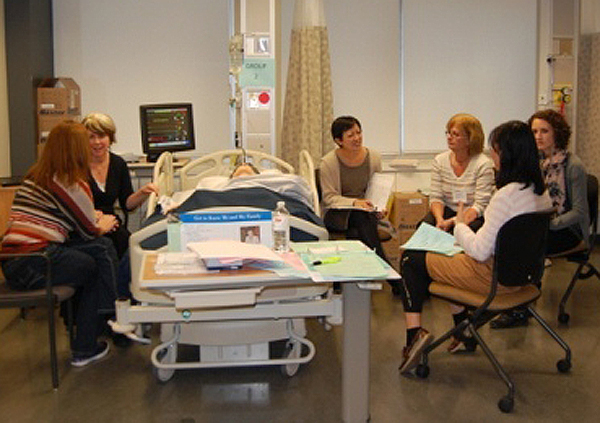Talking about end of life care is a subject many families still consider taboo and may not address until their loved one is already critically ill. By that point, emotions run high, decisions are hard to make and a breakdown in communication with care providers can occur. For many patients and family members, along with nurses committed to saving lives, it is a hard transition to consider end of life, palliative care. On October 19, 2012, Bloomberg Nursing’s Centre for Professional Development (PD) presented its first course on how to approach discussions around “End of Life in Critical Care Nursing – A Simulation Course on Communication with Families.”
Twenty-four Registered Nurses (RNs) from Kingston, Belleville, Toronto and Hamilton took part in this all-day program that combined classroom learning with simulated practice sessions. The RNs, already familiar with end of life care, attended this session in order to increase their understanding of communication issues in end of life care, and improve skills in facilitating discussion with families and mitigating potential conflict.
“Nurses are closest to the patients and families,” says Doris Leung RN, PhD, Assistant Professor and course faculty member. “They are the first to recognize when patients are dying and want to help them and their families to prepare for death. In these settings where technology is available to aggressively prolong life, it takes a lot of courage and commitment to approach conversations about end of life.”
The course was developed and delivered by a highly expert group of 12 adjunct and appointed faculty from Bloomberg Nursing, who have expertise in either critical care or palliative care nursing. The morning session focused on addressing possible situations and reactions while building a framework for end of life discussions with health care teams, patients and families. Rounding out the in-class portion was an intense look at the role of communication in end of life care circumstances.
Participants then had the chance to practice in Bloomberg Nursing’s state-of-the-art Simulation Laboratory. Set-up to recreate the sights and sounds of an intensive care unit, the lab provided a controlled environment for the RNs to use their communication skills in simulations with trained actors. By the end of day, the intensive look at the contributing factors to end of life care decisions equipped the RNs to better support family members and patients in a critical care environment.
